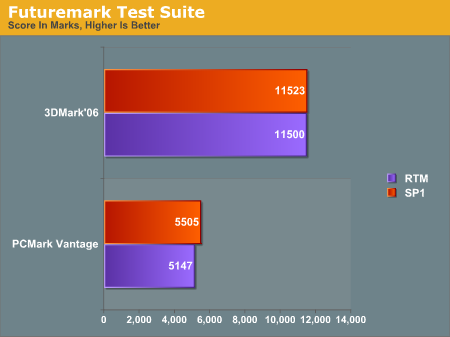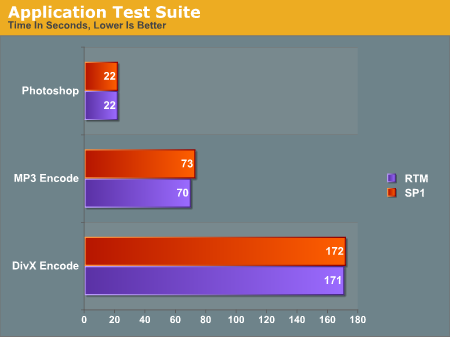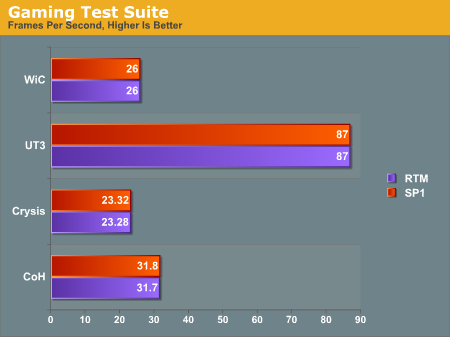Vista vs. Vista SP1
We’ll start with our Futuremark benchmark applications, 3DMark 2006 and PCMark Vantage. 3DMark in spite of being a graphics benchmark is sensitive enough to pick up on any changes in CPU or GPU performance (in this case any optimizations that reduce overhead), while PCMark Vantage is a full suite of benchmarks to measure overall system performance. It’s also one of the few benchmarks that we’re using that has a 64-bit mode.

Starting with 3DMark, the change in performance is effective imperceptible at 0.2%, well within experimental variance. This just goes to show there haven’t been any changes in overhead. PCMark however is far more interesting; here we get a full 7% score increase, indicating that SP1’s effects are felt outside of our earlier benchmarks. Drilling down ino PCMark’s subscores, we found that the higher score is a result of improvements in data compression scores, data encryption scores, and searching in Windows Mail, all of which can be attributed to improvements in file I/O performance. All other subscores are virtually unchanged.
Moving on to our application specific benchmarks, we have our DivX encoding test, our iTunes/LAME MP3 encoding test, and the Retouch Artists speed test for Photoshop. DivX stresses I/O somewhat, while the rest of the tests are largely memory and CPU-bound.

Here we see no notable changes in performance moving to SP1. All of the application tests come back with virtually identical scores.
Finally we have our gaming tests. Games tend to be good
a great way to stress all the components in a system, so this should give us a better idea
of how far improvements in Vista’s file I/O system stretch. For our games we have the RTSes World in Conflict and Company of Heroes, and the FPSes Crysis and Unreal Tournament 3.

In spite of the more rounded nature of gaming tests compared to our application tests, the results are the same with no perceivable improvement in performance. At this point it’s clear that what performance improvements Vista does offer are limited to a handful of situations where we are specifically file or network I/O bound. What this means for any given application is that it is unlikely to see a performance improvement due to SP1.
We also ran some quick testing with startup and shutdown times to see if Vista improved performance there at all; there were a couple of hotfixes in SP1 that dealt with these matters.
| Vista Startup/Shutdown Performance | ||
| |
Pre-SP1
|
Post-SP1
|
| Startup Time |
33 Seconds
|
28 Seconds
|
| Shtudown Time |
32 Seconds
|
31 Seconds
|
| . | ||
While shutdown time doesn’t see any real performance improvements, we are surprised to see an improvement in startup time by several seconds. Vista is not notably slow to start up in the first place, so we weren’t expecting much improvement if there was to be any at all. Shaving off 5 seconds for a 14% improvement in startup time (getting startup below 30 seconds altogether) is a pleasant surprise.










62 Comments
View All Comments
Per Hansson - Wednesday, February 27, 2008 - link
On the steam survey I think Windows 2003 64 bit is the same thing as XP x64, they share the exact same codebase (even serivcepack and hotfixes) It accounts for 0.73%But yes, I agree, XP x64 is a very nice OS
It is IMO more stable than XP (it is afterall a server OS since it's based on Server 2003 x64)
Brunnis - Wednesday, February 27, 2008 - link
Although more of academical interest, I'm sure I'm not alone in wanting to see the performance difference between an unpatched Vista RTM installation and Vista SP1.One pretty serious issue with Vista, that I can't seem to wrap my head around, is the folder types and how they're applied. They actually seem to be applied arbitrarily and without any sort of reason. They also sometimes seem to change without user interaction. I was hoping Vista would somehow address this, but it seems Microsoft is content with how it works.
Otherwise I'm actually quite happy with Vista. I view SuperFetch as one of its most important features and one that actually makes Vista feel a good deal faster for general usage.
amandahugnkiss - Wednesday, February 27, 2008 - link
in the article: http://www.dailytech.com/article.aspx?newsid=10781">http://www.dailytech.com/article.aspx?newsid=10781it was reported that MS was bricking PCs, I would have imagined you guys would have adressed that issue here. At least report if it was still an issue, was a false lead, or what the issue was and what the was that MS implemented.
Any info on this topic you can share?
Ryan Smith - Wednesday, February 27, 2008 - link
We mention it a bit on the last page; basically it looks like a very small number of computers having problems, but it's hard to cut through the echo chamber effect of the internet. AFAIK that update still hasn't been reinstated on Windows Update though.We haven't experienced the issues on any computers we own.
amandahugnkiss - Wednesday, February 27, 2008 - link
My bad, you did indeed mention it.I'm curious what the problem was, be it user, MS, 3rd party, etc... I've not seen it and the only place I have heard about it was on the user forum linked in the article.
IAMGOOSE - Wednesday, February 27, 2008 - link
"We’re still waiting on someone besides Apple to start shipping consumer machines (or motherboards) with UEFI support, so this will be an issue we’ll pick up another day."Current intel branded boards allow booting from UEFI
You guys should try it out, in a mini review or something
kilkennycat - Wednesday, February 27, 2008 - link
Heading asks the question.......mechBgon - Wednesday, February 27, 2008 - link
...but may I make a suggestion: Vista and WinXP aren't, like, video cards, where framerates are all that matter. I frankly feel that the security advances of Vista are getting important in today's security landscape, and a comparison of WinXP SP3 versus Vista SP-anything deserves to cover that. Not much point in having another 10 frames per second in WoW, after the bad guys dropped an undetected keylogger into your system and stole your WoW stuff to auction it off. ;) Drop me a PM if you want to pick my brain on the subject...yyrkoon - Wednesday, February 27, 2008 - link
Cant say I agree with your security views. Any OS(with a few exceptions . . .ME comes to mind) is only as good as the user using it.Not only that, the 'bad guys' can not 'drop' a key logger onto your system, unless the 'bad guys' you're referring to are in fact yourself. Files do not auto-magically appear on a system by osmosis, they are downloaded by the user using said system whether the user is actually aware of this or not. Setting up a system correctly will fix a lot of this, while common sense computing habit will take care of the rest. This includes setting up proper user/group policies, permissions, etc, and MAYBE using web based email if you're having issues with you email client being exploited in unexplainable ways.
Been running XP Pro here for the last 3 years or so, and I have to say that since SP2, it has been fairly secure(once again; when set up proeprly), and I would not expect Vista would be any more reliable. Now since I beta tested Vista early on through to RC2, I KNOW for a fact that compared to XP, there ARE performance issues.
SilthDraeth - Thursday, February 28, 2008 - link
You may be a security professional, but I have no knowledge of you on the ATOT security forums. MechBgon however is very active and has a proven record of being extremely knowledgeable. Heck he spends most days trying dissecting this stuff to find out how to fix it.I think you are fighting a losing battle if you go up against him...instead try to learn.